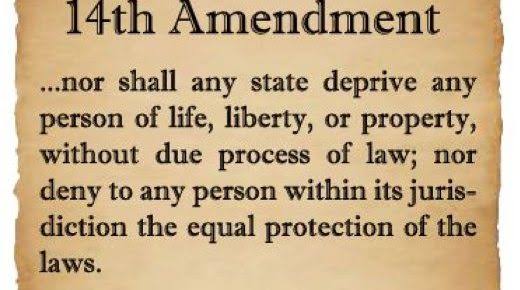The Fourteenth Amendment was ratified on July 28, 1868: “all persons born or naturalized in the United States” which included former slaves who had just been freed after the Civil War.
Fourteenth Amendment Ratified
The first time the Fourteenth Amendment was presented for their consideration, ten of the eleven states of the former Confederacy (the exception being Tennessee) failed to ratify it, for the reasons mentioned above, among others. For the Radical Republicans, this was really the last straw. Flush with victory in the 1866 congressional elections, the Radicals decided that the South should be punished. As Wisconsin’s senator James Doolittle put it, “The people of the South have rejected the constitutional amendment and therefore we will march upon them and force them to adopt it at the point of the bayonet” and rule them with military governors and martial law “until they do adopt it.” It was through coercion, then, that the Republicans determined to bring about the amendment’s ratification.
In 1867 Congress passed a series of Reconstruction Acts over Johnson’s vetoes. They declared that with the exception of Tennessee, no legal governments existed in any of the former Confederate states. The ten recalcitrant states would be divided into five military districts and ruled by military governors and martial law. For those states to take their places in the Union and gain representation in Congress once again, they would have to do the following:
Elect delegates to state constitutional conventions to draw up new state constitutions. In those new constitutions, acknowledge the abolition of slavery, the unlawfulness of secession, and the introduction of black suffrage. Ratify the Fourteenth Amendment.
Fourteenth Amendment Ratified
The president condemned the Reconstruction legislation. According to Johnson it was “in its whole character, scope, and object without precedent and without authority, in palpable conflict with the plainest provisions of the Constitution, and utterly destructive to those great principles of liberty and humanity for which our ancestors on both sides of the Atlantic have shed so much blood and expended so much treasure.” Johnson argued that Radical Reconstruction showed such contempt for law and precedent that it proved the Southern secessionists’ point at the time they withdrew from the Union: that their constitutional liberties would not be secure under the administration elected in 1860. He said:
Those who advocated the right of secession alleged in their own justification that we had no regard for law and that the rights of property, life, and liberty would not be safe under the Constitution as administered by us. If we now verify their assertion, we prove that they were in truth fighting for their liberty, and instead of branding their leaders as traitors against a righteous and legal government, we elevate them in history to the rank of self-sacrificing patriots, consecrate them to the admiration of the world, and place them by the side of Washington, Hampden, and Sidney.
In his third annual message to the Union, Johnson went so far as to argue that Radical policy had destroyed the Union that the Framers established:
Candor compels me to declare that at this time there is no Union as our fathers understood the term, and as they meant it to be understood by us. The Union which they established can exist only where all the States are represented in both Houses of Congress; where one state is as free as another to regulate its internal concerns according to its own will, and where the laws of the central Government, strictly confined to matters of national jurisdiction, apply with equal force to the people of every section.
Cite This Article
"Fourteenth Amendment Ratified on July 28, 1868" History on the Net© 2000-2024, Salem Media.
July 27, 2024 <https://www.historyonthenet.com/fourteenth-amendment-ratified>
More Citation Information.






